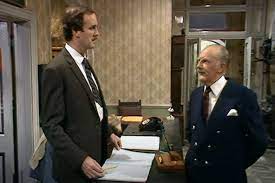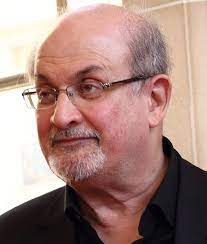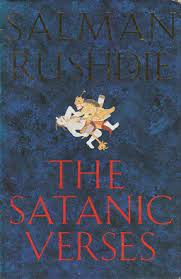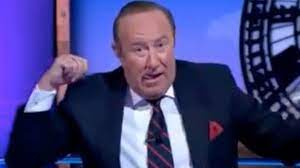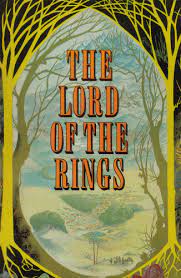
© George Allen & Unwin
I’ve never really liked J.R.R. Tolkien’s Lord of the Rings trilogy (1954-55). There… I’ve said it.
When I was a teenager I had The Fellowship of the Rings, The Two Towers and The Return of the King within the covers of one weighty tome that ran to 1077 pages. I stumbled through about 800 pages of it. Sometimes I left it aside for months and when I returned I had to reread long tracts of it to remind myself what was going on. Eventually, I abandoned it forever at the bit where Frodo and Sam blunder into the lair of Shelob, the giant spider. Thus, for years afterwards, I wasn’t entirely sure if (a) Frodo got to complete his quest, and (b) he didn’t end up as giant-spider-food. Though, given the probability of a happy ending, I assumed that (a) he did, and (b) he didn’t. Finally, in 2003, I saw Peter Jackson’s film adaptation of The Return of the King and my assumptions were confirmed.
I found Tolkien’s writing style plodding at times, but what really defeated me was the dullness of the characters. The evil ones (Gollum, Saruman) were interesting, but as far as the good guys were concerned, the ones I was supposed to be rooting for… Dearie me. I had hopes for Aragorn early on, in his guise as the enigmatic Strider, but my curiosity soon waned. Boromir was agreeably conflicted, but he didn’t make it beyond the end of The Fellowship of the Ring. (In the 2001 movie version, he’s played by Sean Bean, so you know immediately what’s going to happen to him.) Meanwhile, the Hobbits of the Shire were insufferably bland. Their nicey-nicey, respectable, know-your-place-and-respect-your-betters manner so annoyed me that I suspected if the Shire had newspapers, the Daily Mail and Daily Express would dominate the market. Sam Gamgee, tending to Frodo like a batman serving a member of the officer class, was particularly irksome in his cap-doffing.
No wonder the fantasy and science-fiction author Michael Moorcock wrote sourly of Lord of the Rings: “If the Shire is a suburban garden, Sauron and his henchmen are that old bourgeois bugaboo, the Mob – mindless football supporters throwing their beer bottles over the fence, the worst aspects of modern urban society represented as the whole by a fearful, backward-yearning class for whom ‘good taste’ is synonymous with ‘restraint’… and ‘civilised’ behaviour means ‘conventional behaviour in all circumstances’.”
And though I was a teenager at the time, I don’t think it’s likely that if I read The Lord of the Rings now, I’d have an epiphany, revise my opinion of the trilogy and acclaim it as a masterpiece. For one thing, I read Ursula K. Le Guin’s original Earthsea trilogy (1968, 70 & 72) and Mervyn Peake’s Gormenghast trilogy (1946, 50 & 59) around the same time and thought they were brilliant. Indeed, the first two Gormenghast volumes are among my all-time favourite books. Also back then, I tried reading Stephen Donaldson’s Lord Foul’s Bane (1977), which is sometimes credited with kickstarting the ‘grimdark’ movement in modern fantasy – more on that in a moment – and thought it was dreadful shite, an assessment shared by many people whose judgement I trust. So I doubt if my evaluation of Tolkien today would be any different.
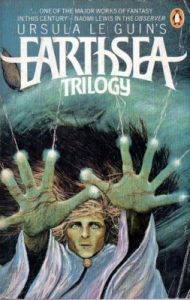
© Penguin Books
I should add that I never had a problem with the Lord of the Rings movies. However, I generally see literature as a denser, more complicated and more profound medium than cinema. And though something might seem a bit staid when written on the page, that doesn’t necessarily mean it’ll be ineffective in the less demanding medium of images and sounds that greets you when you enter a cinema or log into a movie-streaming service. For me, Lord of the Rings was perfectly palatable as a series of two-to-three-hour viewing experiences where you could enjoy the performances of some great actors and actresses (Ian McKellen, Andy Serkis, Cate Blanchett, Viggo Mortensen, Christopher Lee et al), the stunning New Zealand scenery and Peter Jackson’s obvious flair for orchestrating action and spectacle. They contained too much CGI, of course, but that goes without saying these days.
So, why am I writing this? Well, last month saw the publication of an essay entitled Grimdull in the Critic, which Wikipedia describes as a ‘monthly British political and cultural magazine’ whose contributors ‘include David Starkey, Joshua Rozenberg, Peter Hitchens and Toby Young’. The swivel-eyed loopiness of three of those four contributors should give you an idea of where the Critic stands on the political spectrum. The essay’s writer Sebastian Milbank – also The Critic’s executive editor – says this of the author of Lord of the Rings:
“Those who followed Tolkien, even from a commercial perspective, understood that modern fantasy was following in his wake; he gave a sense of moral and literary seriousness to the building of imaginary worlds, which would otherwise be absorbed into moralistic allegory or semi-comical whimsy. Tolkien’s world feels ‘real’ not only because of his attention to detail, but because he builds a sense of emotionally freighted history and recognisable moral stakes, set out in a language strange enough to be compelling, familiar enough to be taken seriously.”
Alas for Tolkien’s worthy legacy, Milbank argues, modern fantasy writing has been taken over and corrupted by grimdark, ‘a recent coinage for an ongoing craze in “gritty” and dark fantasy settings’, popularized by writers such as Joe Abercrombie, Mark Lawrence and the blockbusting, blood-tits-and-dragons-meister that is George R.R. Martin. “It’s a genre…” Milbank bellyaches, “generally in a mediaeval fantasy setting, but shorn of any romance. Characters are overwhelmingly cynical, and those few who exhibit nobility are treated as foolish or naive. Generally a chaotic war is happening, or about to happen. Religion features, but largely as a tool of social control, often portrayed… as even more cruel and cynical than the secular world around it. Dark observations about human nature substitute for any moral drama, with characters seeking to outwit, manipulate or overpower one another in a kind of Darwinian struggle for dominance.”
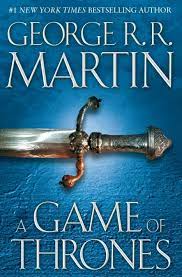
© Bantam Books
Even worse, laments Milbank, it’s all the fault of the liberal left. “It’s a script born of vaguely liberal, vaguely radical, vaguely anarchic sentiments common to most contemporary creative ‘industries’.”
Who shot J.R.R.? Those lefty grimdark degenerates did! Basically, Milbank’s trying to open another front in the culture wars. This time it’s evil, modern fantasy writers versus the decent, traditional, conservative values embodied by Tolkien.
So much is wrong in his analysis that I don’t have time to detail it all here. I’d direct you, though, to this recent riposte penned by the writer Cora Buhlert. Firstly, she takes Milbank to task for his many omissions, made either through ignorance of fantasy literature or through disingenuity. In presenting the field as a simple battleground between Tolkien and grimdark, he ignores Mervyn Peake, Lord Dunsany and the copious fantasy writing that went on in the old American pulp magazines, by the likes of Robert E. Howard, Fritz Leiber and C.L. Moore, which helped popularize the sub-genre of sword and sorcery and gave us the character of Conan the Barbarian. Simultaneously, Buhlert notes, no mention is made of other trends in modern fantasy writing, such as hopepunk, cosy fantasy or romantasy.
Indeed, she points out how Milbank doesn’t so much move the goalposts in his definition of grimdark as go sprinting off with the goalposts over his shoulders. In the course of his tortured polemic, he refers to TV shows like The Walking Dead (2010-22), Boardwalk Empire (2010-14) and Breaking Bad (2008-13) and superhero movies like Captain America: Civil War (2016). Two of those examples aren’t remotely classifiable as fantasy – unless I remember wrongly and Walter White was actually an Orc – while the other two have nothing to do with the literature, set in medieval fantasy worlds, that he’s allegedly writing about.
Milbank also takes potshots at Philip Pullman, even though, as Buhlert observes, books like Pullman’s His Dark Materials trilogy (1995-2000) aren’t grimdark either. Presumably, Pullman gets a mention because, as a famous atheist, he’s a red flag to a bull as far as crazed Christian-morality-campaigners are concerned. (“Philip Pullman is a stupid, delusional, immoral, inhuman piece of garbage, while C.S. Lewis and J.R.R. Tolkien were geniuses, amazing authors, and great human beings,” declared one comment I read on an American fantasy website recently.) And predictably, he slates Michael Moorcock for being ‘terribly dated’ in his anti-establishment views. Strangely, considering how Moorcock’s fantasy stories have greatly influenced the modern fantasy genre too, Milbank attacks him using the example of his 1966 novella Behold the Man, which is actually a work of science fiction.
One other serious flaw that Buhlert identifies in Milbank’s essay is his implication that Tolkien popularised fantasy fiction in one fell swoop in the 1950s. But it wasn’t until the 1960s, when Lord of the Rings appeared in paperback in the USA, and possibly not until the 1970s, when imitators like Terry Brooks began to publish doorstop-sized ‘high-fantasy’ trilogies of their own, that Tolkien’s influence really began to be felt.
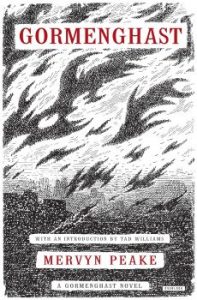
© Overlook Press
I’d add that when I was a teenager it wasn’t just me and Michael Moorcock who disliked Tolkien. I got the impression he wasn’t particularly valued by the literary establishment – whose posh, starchy gatekeepers at the time are probably the sort of chaps whom the young-fogeyish Milbank looks back on with great admiration. Indeed, Edmund Wilson famously dismissed Lord of the Rings as ‘a children’s book that somehow got out of hand’, ‘an overgrown fairy story’, ‘balderdash’ and ‘juvenile trash’. Anthony Burgess conspicuously failed to mention it in his volume Ninety-Nine Novels: The Best in English since 1939, though he was broadminded enough to include science-fiction and fantasy books by and / or authors like Brian Aldiss, J.G. Ballard, Alasdair Gray, George Orwell, Keith Roberts, T.H. White and, yes, Mervyn Peake in his list.
Cora Buhlert complains that Milbank’s essay “feels as if it time-travelled here from the early 2010s… Honestly, has Sebastian Milbank read a single novel or watched a single TV show that came out in the last five years?” Actually, I get the impression he probably did write the thing about a decade ago, perhaps as a moan against the then astronomical popularity of George R.R. Martin’s Game of Thrones (2011-2019) TV series. But, recognising the essay’s myriad shortcomings, he left it on the shelf – until now.
Because today we live in a time where Britain’s Conservative Party politicians, and their hordes of supporters who infest the mainly right-wing British media, are aware that, if the opinion polls and by-election results are to be believed, they’re in for a massive humping at the next general election. So dismal have the Conservatives’ 14 years in government been that their only strategy now is to try and ignite, and fight, a massive culture war on all fronts imaginable.
Thus, we’ve had ex-Tory-prime minister, and catastrophe, Liz Truss – her with the shelf-life of a lettuce – raving about her premiership being sabotaged by ‘trans-activists’ in the civil service. Former Deputy Conservative Party Chairman ‘30p’ Lee Anderson claiming that London’s Labour Party mayor is in the pocket of ‘Islamists’. Neil Oliver ranting about vaccines on far-right channel GB News. The Daily Mail dismissing young people’s mental health problems as ‘snowflakery’. The police, the universities, the judiciary, the National Trust, Net Zero, speed restrictions, the English football team, TV sitcoms, Doctor Who, James Bond, you name it, British right-wingers have tried to pick a fight with it, often for the sin of being ‘woke’.
It was just a matter of time before they got around to modern fantasy literature. Hence, Tolkien’s been weaponized.
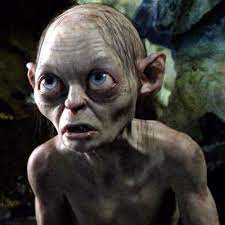
© New Line Cinema / WingNut Films

